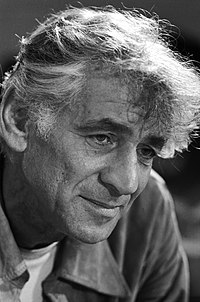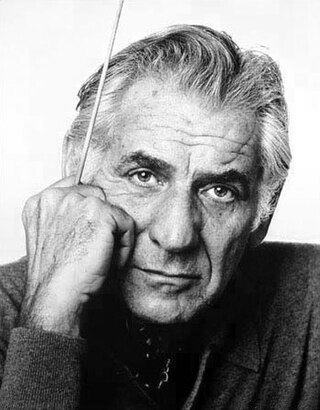
Leonard Bernstein was an American conductor, composer, pianist, music educator, author, and humanitarian. Considered to be one of the most important conductors of his time, he was the first American-born conductor to receive international acclaim. Bernstein was "one of the most prodigiously talented and successful musicians in American history" according to music critic Donal Henahan. Bernstein's honors and accolades include seven Emmy Awards, two Tony Awards, and 16 Grammy Awards as well as an Academy Award nomination. He received the Kennedy Center Honor in 1981.
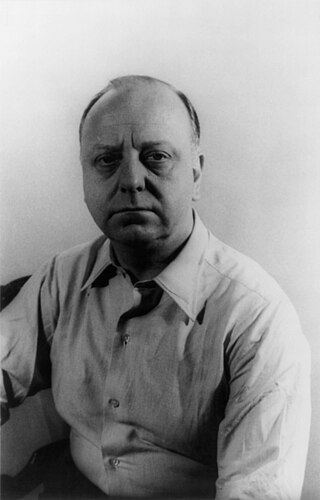
Virgil Thomson was an American composer and critic. He was instrumental in the development of the "American Sound" in classical music. He has been described as a modernist, a neoromantic, a neoclassicist, and a composer of "an Olympian blend of humanity and detachment" whose "expressive voice was always carefully muted" until his late opera Lord Byron which, in contrast to all his previous work, exhibited an emotional content that rises to "moments of real passion".
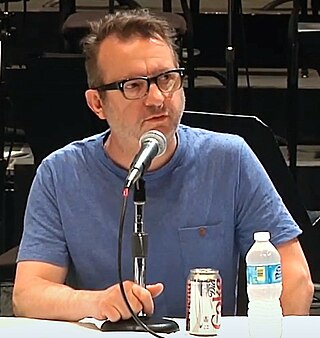
Mark-Anthony Turnage is an English composer of contemporary classical music.

Magnus Gustaf Adolf Lindberg is a Finnish composer and pianist. He was the New York Philharmonic's composer-in-residence from 2009 to 2012 and has been the London Philharmonic Orchestra's composer-in-residence since the beginning of the 2014–15 season.
Unsuk Chin is a South Korean composer of contemporary classical music, who is based in Berlin, Germany. Chin was a self-taught pianist from a young age and studied composition at Seoul National University as well as with György Ligeti at the Hochschule für Musik und Theater Hamburg.
Symphony No. 3 was Aaron Copland's final symphony. It was written between 1944 and 1946, and its first performance took place on October 18, 1946 with the Boston Symphony Orchestra performing under Serge Koussevitzky. If the early Dance Symphony is included in the count, it is actually Copland's fourth symphony.

Chichester Psalms is an extended choral composition in three movements by Leonard Bernstein for boy treble or countertenor, choir and orchestra. The text was arranged by the composer from the Book of Psalms in the original Hebrew. Part 1 uses Psalms 100 and 108, Part 2 uses 2 and 23, and Part 3 uses 131 and 133. Bernstein scored the work for a reduced orchestra, but also made a version for an even smaller ensemble of organ, one harp, and percussion.
Richard Danielpour is a music professor at the University of California, Los Angeles.

Leonard Bernstein's Sonata for Clarinet and Piano, written during 1941–42 and published in 1942, was Bernstein's first published piece. It is dedicated to clarinetist David Oppenheim, whom Bernstein met while studying conducting with Serge Koussevitzky at Tanglewood during the summers of 1940 and 1941.
Christopher Chapman Rouse III was an American composer. Though he wrote for various ensembles, Rouse is primarily known for his orchestral compositions, including a Requiem, a dozen concertos, and six symphonies. His work received numerous accolades, including the Kennedy Center Friedheim Award, the Grammy Award for Best Classical Contemporary Composition, and the Pulitzer Prize for Music. He also served as the composer-in-residence for the New York Philharmonic from 2012 to 2015.
Songfest: A Cycle of American Poems for Six Singers and Orchestra is a 1977 song cycle by Leonard Bernstein. The cycle consists of 12 settings of 13 American poems, performed by six singers in solos, duets, a trio, and three sextets.

Barry Ernest Conyngham,, is an Australian composer and academic. He has over seventy published works and over thirty recordings featuring his compositions, and his works have been premiered or performed in Australia, Japan, North and South America, the United Kingdom and Europe. His output is largely for orchestra, ensemble or dramatic forces. He is an Emeritus Professor of both the University of Wollongong and Southern Cross University. He is former Dean of the Faculty of the Fine Arts and Music at the University of Melbourne.
Ḥalil is a work for flute and chamber orchestra composed by Leonard Bernstein in 1981. The work is sixteen minutes in length. Bernstein composed Ḥalil in honor of a young Israeli flutist Yadin Tanenbaum who was killed at the Suez Canal during the 1973 Yom Kippur war. The work was premiered at the Sultan's Pool in Jerusalem on May 27, 1981 with Jean-Pierre Rampal as the soloist and Bernstein conducting the Israel Philharmonic. The American premiere took place at Tanglewood on July 4, 1981 with Doriot Anthony Dwyer as the soloist and members of the Boston Symphony Orchestra.
Anna Clyne is an English composer, now resident in New York City, US. She has worked in both acoustic music and electroacoustic music.
The following is a list of musical works which received their premieres at Carnegie Hall:
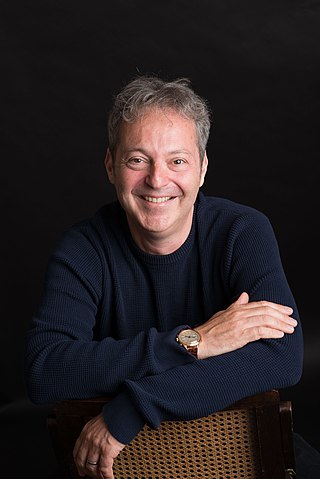
Nimrod Borenstein is a British-French-Israeli composer whose music is widely performed throughout Europe, the US, Canada, Australia, and Japan. His works are becoming part of the repertoire of many ensembles and orchestras.
The Symphony No. 3 is a composition for orchestra by the American composer Ned Rorem. The work was first performed by the New York Philharmonic under the direction of Leonard Bernstein at Carnegie Hall on April 16, 1959.
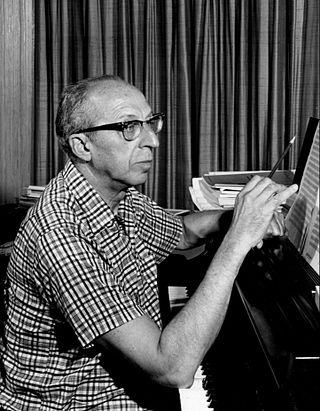
Danzón cubano is a composition for two pianos by American composer Aaron Copland. The piece, written in 1942, was inspired by the Cuban genre of the same name. It was first arranged for orchestra in 1946.
The Concerto for Piano and Orchestra is a musical composition by the American composer Aaron Copland. The work was commissioned by the conductor Serge Koussevitzky who was then music director of the Boston Symphony Orchestra. It was first performed on January 28, 1927, by the Boston Symphony Orchestra conducted by Koussevitzky with the composer himself as the soloist. The piece is dedicated to Copland's patron Alma Morgenthau Wertheim.

Divertimento, or Divertimento for Orchestra, is a suite of eight orchestral bagatelles by American composer Leonard Bernstein. Completed in 1980 and written to celebrate the centenary of the Boston Symphony Orchestra, it is well-known for featuring the notes B and C in most of its melodic material.
